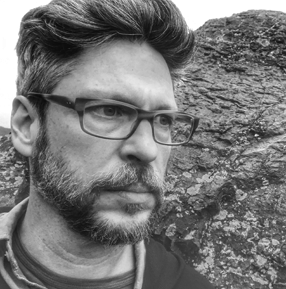Broken Music
Every turn I took in the city
pressed me deeper into the warren
of what I hadn’t said, the words
thickening, constricting like a throat
as I moved through the streets,
oblivious to traffic and high walls,
the rain gutters’ crooked mouths
staining the pavement, human faces
mooning past me, indifferent,
eclipsing my silence
with their phones, their apparitions
floating—where?—and everyone,
everyone talking to the air.
Until around a new corner
on a narrow street I’d never seen
a piano began to play from above
a window-muffled music
at odds with itself, the rush of notes
splintering like glass across a floor
then picked back up, piece
by piece—first one hand sorting
along the keys, then the other
joining, out of step, irreconcilable,
unpunctuated by frustration,
or shame, but stung with the urgency
to make what couldn’t yet
be made. How could anyone learn
their way out of such blunder,
how could any song be gathered
from those shards grating
like something lodged in a shoe.
My ear cocked into the air,
I thought of floating up, balloon-like,
to look. I felt cartoonish,
a marvel of the last century’s
animation already out of date.
I could have gone on like that,
listening, loosening into the song,
but then the piano stopped.
My ears filled with waiting—
car horns and chatter, the wheeze
of a stopping bus, the city going
about its filthy exclamations,
its abandon. The window
darkened as the player shut
the light over the sheet music,
and it reflected another window
across the street that in turn
reflected a bit of sky, a plane’s
bright sideways thought
trolling across the pane
music once broke through—
delirious and awful and unabashed,
and so unlike what I’d wanted to say
swollen now, a contrail
coming extravagantly undone,
or a balloon full of glass.
Copyright © 2019 by Corey Marks. Originally published in Poem-a-Day on September 17, 2019, by the Academy of American Poets.
“In writing ‘Broken Music,’ I thought about how the walks I so often take can both encourage and challenge inwardness, and I found myself returning to A. R. Ammons’ notion that a walk externalizes ‘an inward seeking.’ The poem began as a description of wandering through increasingly unfamiliar city streets but soon started tracing a meditation on reticence and daring. I found myself interested in how the speaker’s worry propelled him on an aimless circuit that finally led him to overhear someone else's unabashed music that jangled him out of his preoccupations.”
—Corey Marks

